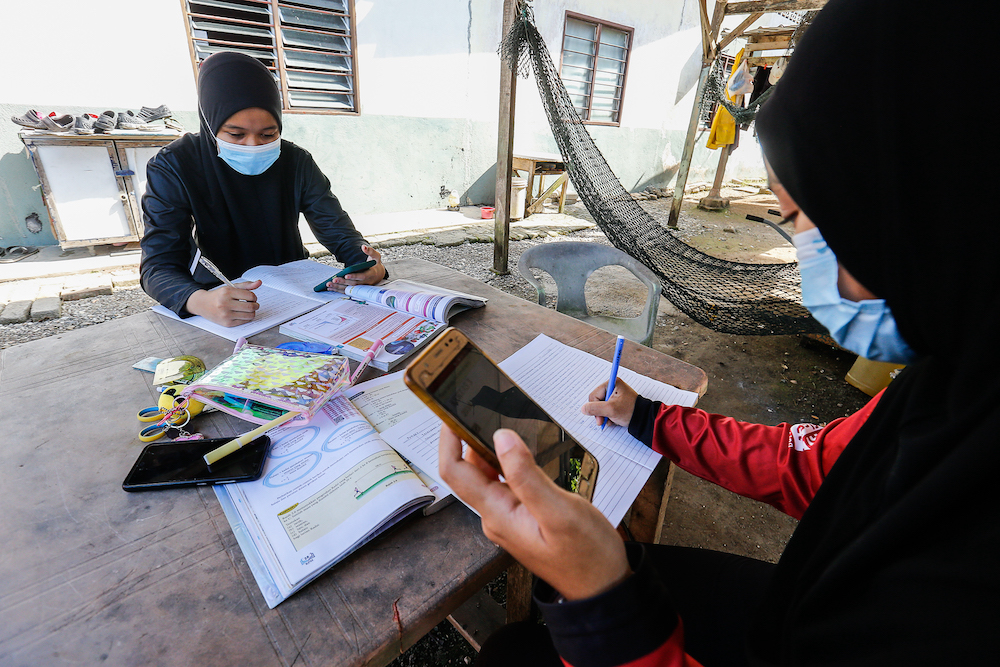KUALA LUMPUR, July 24 — With schools forced to shut temporarily and in-person classes replaced by online ones, the Covid-19 pandemic has in essence crippled the education sector in Malaysia.
As a result of this sudden change in teaching and learning methods, many students have been left behind.
In response, a group of young working adults came up with a programme called Rakan Tutor earlier this year to assist students who are in need of additional lessons.
The idea of Rakan Tutor was an extension of a three-month pro bono strategy project on remediation strategies for Covid-19 learning loss and inequality with a Malaysia-based education non-profit organisation.
“Through interviews with teachers, we were disheartened to hear that many students from disadvantaged families dropped out to work as the pandemic had affected household income.
“There are also those who couldn’t catch up and lost interest in learning due to connectivity issues and could not afford gadgets that are needed for online lessons,” its co-founder Eer Kai Song, who works as a consultant by profession, told Malay Mail.
The Covid-19 pandemic forced a nationwide shutdown of schools from March to July 2020, November 2020 to April 2021, and most recently, in May, due to infections rising exponentially.
.jpg)
However, as Malaysia grapples with another spike in cases, it remains uncertain whether schools will reopen as planned in September.
Among other reasons, which inspired the Rakan Tutor team to embark on this initiative, was their discovery that on average, a prolonged period of remote learning comes at a cost to students, with an estimated loss of 0.9 years of learning after seven months of school closure.
They cited the example of the aftermath of Hurricane Katrina in the United States, whereby students came back on an average of two years below grade level, and New Orleans schools are still dealing with learning loss 15 years later.
Rakan Tutor also learned that based on the latest survey by Unesco, the Ministry of Education has no plans to introduce nationwide remedial or accelerated programmes.
“While some families are able to send their children for tuition classes, many cannot afford to do this.
“So this is where we come in, to assist these students who need help but cannot afford a paid tuition teacher.
“This is why we built Rakan Tutor — to offer free tutoring to underserved secondary school students in Malaysia, to equip them with skills and confidence to perform better academically and gain motivation to achieve their fullest potential,” said Eer.

How does it work?
Rakan Tutor is a programme that is powered by (pre)university students and young professionals who are willing to volunteer their time to tutor a student between two and three hours per week.
According to Eer, tutors are recruited from all over the world, but with the criteria that they are Malaysians and must possess good grades for the subject that they will be tutoring — Modern Mathematics.
The tutor will then be put through a vetting process where they are required to submit their SPM (Sijil Pelajaran Malaysia) transcript as proof that they scored an ‘A’ for the Modern Mathematics subject.
“Each tutor is then matched with a student, so that the tutor is able to monitor his or her progress and assist the student accordingly,” said Eer.
Each tutor, prior to the programme commencement, will undergo training which includes interpersonal skills such as how to empathise with students who lack confidence, Eer added.
“Currently, we are in touch with teachers in secondary schools, to identify which students have difficulties in coping with the subject, so that we can offer our tutoring assistance.
“We found that it is best to work with these teachers as they know each of the student’s progress in school,” said Eer.
For students who are unable to utilise online platforms, Eer said Rakan Tutor has other options available such as voice call, especially for remote areas that have patchy connectivity.
“We are looking at running this programme for the long run, as from our ground research, we understand that it will take a long time for students to catch up on time lost at school.
“Not just the students who are sitting for SPM, but also those who are preparing for SPM,” she said.



















